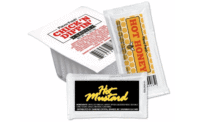Rockville, Md./Press Release -- Key trends and opportunities within the U.S. market for flavors center on ever-changing consumer preferences and recent ongoing and anticipated advances in food flavor technology. Consumers’ continued yearning for food that is fresh, fast, and healthy is driving innovation and new food and flavor product development, according to "U.S. Market for Flavors" by market research company Packaged Facts. Looking ahead, the value of the total U.S. market for flavors -- including flavor additives, flavor enhancers, sugar substitutes, and spices -- will increase from $6 billion in 2014 to $7 billion in 2019.
More than ever, healthy does not just mean which types of food a shopper buys, but also what is in that food, notes Packaged Facts research director David Sprinkle. From trans fats to gluten, consumer grocery lists have a growing number of things to avoid. With respect to flavorants, a growing number of U.S. shoppers are looking to avoid additives that they perceive as being unhealthy. Examples include monosodium glutamate (MSG) and other glutamates and artificial flavors.
The current trend toward clean labels presents a significant and fast growing opportunity segment. Food manufacturers that can shorten their ingredient lists and substitute artificial and unrecognizable ingredients with natural or recognizable ingredients will continue to edge up in market share and market penetration. Also, many natural additives have reduced shelf stability, in comparison to the artificial additives that they replace. Flavor, in particular, has a way of degrading more rapidly for all natural products. This situation presents ample opportunity for the development of natural, shelf stable flavors that can meet consumer demand for clean labels.
Advances in food technology are enabling the development of exciting new flavor and food products. For example, although flavor encapsulation technology has been around since the 1940s, increasing consumer demand for clean labels and natural flavors, combined with new innovations in food and beverage flavor development, is giving flavor encapsulation a new lease on life. The technology has a growing array of applications, and has been pulled into the portfolios of most major flavor houses that are active in the U.S. market. Likewise, flavor enhancers are also receiving a makeover. For example, a suite of new MSG-replacers tout enhanced umami flavor, with some also functioning as sodium replacers.






